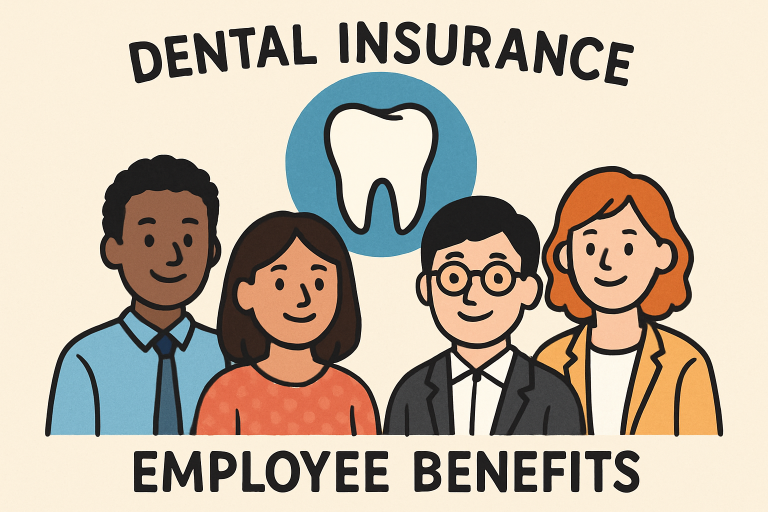Key Takeaways
- Offering dental insurance can significantly boost employee retention and satisfaction.
- Various dental insurance options exist to meet different business needs and budgets.
- Dental coverage translates to better employee health and reduced absenteeism.
Introduction
Offering comprehensive benefits is essential for small businesses striving to attract top talent and foster a positive workplace culture. Dental insurance stands out as a valuable offering, enhancing employee satisfaction and supporting overall well-being. Integrating small business dental insurance into your employee benefits package can set your business apart, paving the way for stronger employee retention, improved morale, and a healthier workforce.
Employees today expect more than just a paycheck; they’re looking for robust benefits that support their long-term health and security. A well-chosen dental plan signals that your company values its team, offering real support for preventive care and peace of mind in dealing with unexpected dental expenses.
Why Dental Insurance Matters for Small Businesses
Dental health is intrinsically tied to overall health, making dental insurance a high-priority benefit for many employees. According to the Society for Human Resource Management, 88% of employees identify health, dental, and vision insurance as key factors in job selection and retention. In a competitive hiring landscape, providing dental coverage can give your business the edge to attract and keep quality employees.
Dentists recommend routine dental visits for preventive care, but many employees may skip necessary appointments without insurance due to cost concerns. When small businesses include dental benefits, they help their staff avoid costly dental emergencies in favor of preventive care—ultimately fostering a healthier, happier workforce.

Alongside retention, dental benefits also impact workplace productivity. Poor oral health can lead to pain, missed workdays, and even secondary medical issues. Covering dental costs removes a barrier to care, leading to improved attendance and performance.
For more insights on how dental and other benefits influence company culture and employee well-being, Harvard Business Review discusses the far-reaching impact of employee benefits on organizational health and success.
Types of Dental Insurance Plans for Small Businesses
Preferred Provider Organization (PPO) Plans
PPO dental plans offer employees the flexibility to choose any dentist, though they’ll save more by staying in-network. These plans commonly cover a percentage of preventive, basic, and primary dental services, balancing affordability and choice for small businesses.
Health Maintenance Organization (HMO) Plans
HMO dental plans require employees to select a primary dentist from a network and often have lower premium costs. The trade-off is lesser flexibility in choosing providers, but out-of-pocket expenses tend to be more predictable.
Indemnity Plans
Indemnity dental insurance allows employees to visit any licensed dentist and reimburses some incurred costs, offering maximum choice but often at a higher overall expense.
The National Association of Dental Plans explains in detail how dental benefit models work and their typical coverage structures.
Advantages of Offering Dental Insurance
- Enhanced Employee Satisfaction: Dental benefits signal investment in employee health, fostering goodwill and loyalty that translate into better retention rates.
- Improved Overall Health: Regular coverage-driven dental check-ups prevent serious medical issues, lowering absenteeism and increasing workplace productivity.
- Tax Benefits: Small businesses often enjoy tax-deductible premiums for employee dental insurance, reducing the associated financial burden.
During routine check-ups, dentists can often detect early signs of chronic illnesses such as diabetes and heart disease, amplifying the preventive value of dental insurance.
Cost Considerations
Budget is a primary concern for small business owners weighing dental insurance options. Fortunately, plan design has considerable flexibility—many providers offer coverage solutions scaled to business size and budget. For example, some carriers enable voluntary employee-paid options or employer contributions to premiums, ensuring affordability without forgoing quality care.
Small businesses should review their workforce demographics and potential plan utilization to choose coverage that offers the best value. Before making a commitment, it’s crucial to compare providers for network size, customer service, and plan features.
Implementing a Dental Insurance Plan
- Assess Employee Needs: Gather feedback via surveys or informal conversations to understand your team’s dental care priorities. This ensures alignment between the plan and employee expectations.
- Research Providers: Compare different insurers, evaluating costs, plan flexibility, and provider networks to find the best match for your business.
- Communicate Benefits: To maximize utilization and satisfaction, roll out the coverage with clear, ongoing communication about what’s covered, how to access care, and any out-of-pocket costs.
Real-Life Example
A small technology startup decided to incorporate dental insurance into its employee benefits package as a strategic move to remain competitive in attracting and retaining top talent. Within just one year, the company experienced a 15% increase in employee retention, reflecting the value staff placed on comprehensive benefits. Employees reported feeling more appreciated and supported, translating into higher morale and a stronger workplace satisfaction. The availability of dental coverage also led to a measurable decrease in sick days, as oral health issues were addressed proactively rather than escalating into more serious problems. Beyond individual health improvements, the positive impact extended to overall team productivity, engagement, and collaboration, demonstrating how thoughtful benefits design can strengthen employee well-being and organizational performance in meaningful, measurable ways.
Conclusion
Offering dental insurance is more than just a benefit—it’s a strategic investment that strengthens your employees’ well-being and your business’s long-term success. A thoughtfully chosen dental plan, based on your workforce and aligned with your budget, can improve overall job satisfaction and employee retention. Regular preventive care helps reduce costly dental issues, decrease absenteeism, and enhance productivity. Employees who feel cared for are more engaged, motivated, and loyal, creating a positive workplace culture that benefits the entire organization. For small businesses navigating competitive markets, providing comprehensive dental coverage signals a commitment to health and stability, setting you apart as an employer of choice. You create a foundation for stronger performance, morale, and sustainable growth by prioritizing employee wellness.

